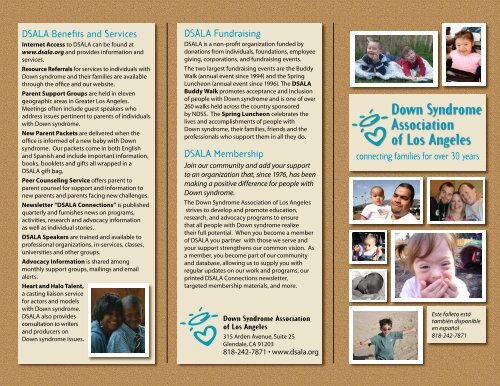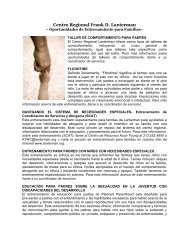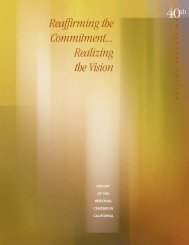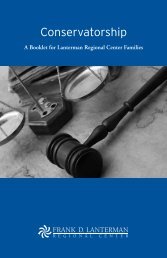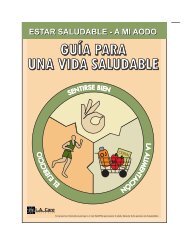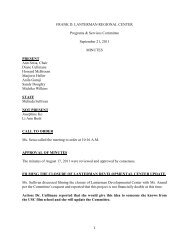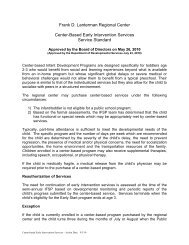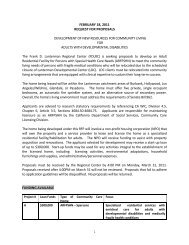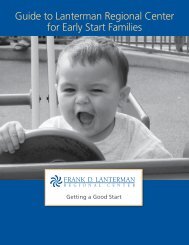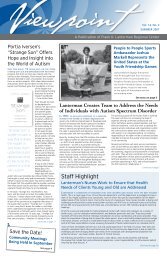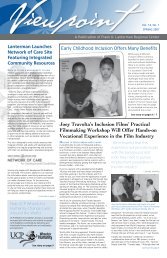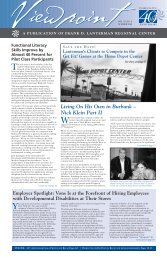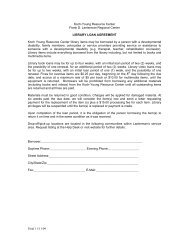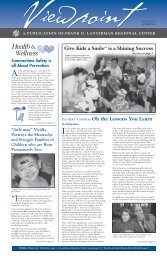Down Syndrome Association of Los Angeles - Frank D. Lanterman ...
Down Syndrome Association of Los Angeles - Frank D. Lanterman ...
Down Syndrome Association of Los Angeles - Frank D. Lanterman ...
Create successful ePaper yourself
Turn your PDF publications into a flip-book with our unique Google optimized e-Paper software.
DSALA Benefits and Services<br />
Internet Access to DSALA can be found at<br />
www.dsala.org and provides information and<br />
services.<br />
Resource Referrals for services to individuals with<br />
<strong>Down</strong> syndrome and their families are available<br />
through the <strong>of</strong>fice and our website.<br />
Parent Support Groups are held in eleven<br />
geographic areas in Greater <strong>Los</strong> <strong>Angeles</strong>.<br />
Meetings <strong>of</strong>ten include guest speakers who<br />
address issues pertinent to parents <strong>of</strong> individuals<br />
with <strong>Down</strong> syndrome.<br />
New Parent Packets are delivered when the<br />
<strong>of</strong>fice is informed <strong>of</strong> a new baby with <strong>Down</strong><br />
syndrome. Our packets come in both English<br />
and Spanish and include important information,<br />
books, booklets and gifts all wrapped in a<br />
DSALA gift bag.<br />
Peer Counseling Service <strong>of</strong>fers parent to<br />
parent counsel for support and information to<br />
new parents and parents facing new challenges.<br />
Newsletter “DSALA Connections” is published<br />
quarterly and furnishes news on programs,<br />
activities, research and advocacy information<br />
as well as individual stories.<br />
DSALA Speakers are trained and available to<br />
pr<strong>of</strong>essional organizations, in-services, classes,<br />
universities and other groups.<br />
Advocacy Information is shared among<br />
monthly support groups, mailings and email<br />
alerts.<br />
Heart and Halo Talent,<br />
a casting liaison service<br />
for actors and models<br />
with <strong>Down</strong> syndrome.<br />
DSALA also provides<br />
consultation to writers<br />
and producers on<br />
<strong>Down</strong> syndrome issues.<br />
DSALA Fundraising<br />
DSALA is a non-pr<strong>of</strong>it organization funded by<br />
donations from individuals, foundations, employee<br />
giving, corporations, and fundraising events.<br />
The two largest fundraising events are the Buddy<br />
Walk (annual event since 1994) and the Spring<br />
Luncheon (annual event since 1996). The DSALA<br />
Buddy Walk promotes acceptance and inclusion<br />
<strong>of</strong> people with <strong>Down</strong> syndrome and is one <strong>of</strong> over<br />
260 walks held across the country sponsored<br />
by NDSS. The Spring Luncheon celebrates the<br />
lives and accomplishments <strong>of</strong> people with<br />
<strong>Down</strong> syndrome, their families, friends and the<br />
pr<strong>of</strong>essionals who support them in all they do.<br />
DSALA Membership<br />
Join our community and add your support<br />
to an organization that, since 1976, has been<br />
making a positive difference for people with<br />
<strong>Down</strong> syndrome.<br />
The <strong>Down</strong> <strong>Syndrome</strong> <strong>Association</strong> <strong>of</strong> <strong>Los</strong> <strong>Angeles</strong><br />
strives to develop and promote education,<br />
research, and advocacy programs to ensure<br />
that all people with <strong>Down</strong> syndrome realize<br />
their full potential. When you become a member<br />
<strong>of</strong> DSALA you partner with those we serve and<br />
your support strengthens our common vision. As<br />
a member, you become part <strong>of</strong> our community<br />
and database, allowing us to supply you with<br />
regular updates on our work and programs, our<br />
printed DSALA Connections newsletter,<br />
targeted membership materials, and more.<br />
<strong>Down</strong> <strong>Syndrome</strong> <strong>Association</strong><br />
<strong>of</strong> <strong>Los</strong> <strong>Angeles</strong><br />
315 Arden Avenue, Suite 25<br />
Glendale, CA 91203<br />
818-242-7871 • www.dsala.org<br />
<strong>Down</strong> <strong>Syndrome</strong><br />
<strong>Association</strong><br />
<strong>of</strong> <strong>Los</strong> <strong>Angeles</strong><br />
connecting families for over 30 years<br />
Este folleto está<br />
también disponible<br />
en español<br />
818-242-7871
<strong>Down</strong> <strong>Syndrome</strong><br />
<strong>Association</strong> <strong>of</strong> <strong>Los</strong> <strong>Angeles</strong><br />
The <strong>Down</strong> <strong>Syndrome</strong> <strong>Association</strong> <strong>of</strong> <strong>Los</strong> <strong>Angeles</strong><br />
(DSALA), a non-pr<strong>of</strong>it organization, has been<br />
providing services to individuals with <strong>Down</strong><br />
syndrome and their families since 1976. The<br />
DSALA is an affiliate <strong>of</strong> both the National <strong>Down</strong><br />
<strong>Syndrome</strong> Society (NDSS.org) and the National<br />
<strong>Down</strong> <strong>Syndrome</strong> Congress (NDSCcenter.org).<br />
<strong>Down</strong> <strong>Syndrome</strong> and its Effects<br />
<strong>Down</strong> syndrome occurs when an individual has three,<br />
rather than two, copies <strong>of</strong> the 21st chromosome.<br />
This additional genetic material alters the course<br />
<strong>of</strong> development and causes the characteristics<br />
associated with <strong>Down</strong> syndrome.<br />
<strong>Down</strong> syndrome is the most commonly occurring<br />
chromosomal abnormality. One in every 733<br />
babies is born with <strong>Down</strong> syndrome.<br />
DSALA’s Mission Enhance the welfare <strong>of</strong><br />
people with <strong>Down</strong> syndrome and their families.<br />
Connecting families to other families and to valuable<br />
resources in the their local community<br />
Providing access to the most up-to-date information<br />
Promoting development <strong>of</strong> education, counseling,<br />
employment and recreational programs and services<br />
Increasing public awareness, understanding, and<br />
acceptance <strong>of</strong> <strong>Down</strong> syndrome<br />
There are more than 350,000 people living with <strong>Down</strong> syndrome in the<br />
United States.<br />
<strong>Down</strong> syndrome affects people <strong>of</strong> all ages, races and economic levels.<br />
People with <strong>Down</strong> syndrome have an increased risk for certain medical<br />
conditions such as congenital heart defects, respiratory and hearing problems,<br />
childhood leukemia, thyroid conditions, and Alzheimer’s disease. Many <strong>of</strong><br />
these conditions are now treatable, so most people with <strong>Down</strong> syndrome<br />
lead healthy lives.<br />
A few <strong>of</strong> the common physical traits <strong>of</strong> <strong>Down</strong> syndrome include low muscle tone, small stature, an upward<br />
slant to the eyes, and a single deep crease across the center <strong>of</strong> the palm. Every person with <strong>Down</strong> syndrome is<br />
a unique individual and may possess these characteristics to different degrees or not at all.<br />
Life expectancy for people with <strong>Down</strong> syndrome has increased dramatically in recent decades - from 25 in 1983<br />
to 56 today. DSALA has members over 70 years old.<br />
All people with <strong>Down</strong> syndrome experience cognitive delays, but the effect is usually<br />
mild to moderate and is not indicative <strong>of</strong> the many strengths and talents.<br />
Quality educational programs, a stimulating home environment, good health care,<br />
and positive support from family, friends and the community enable people with<br />
<strong>Down</strong> syndrome to develop their full potential and lead fulfilling lives.<br />
People with <strong>Down</strong> syndrome attend school, find work, participate in decisions that<br />
affect them, and contribute to society.<br />
Research<br />
The recent mapping <strong>of</strong> the human genome has<br />
ushered in an unprecedented opportunity for<br />
<strong>Down</strong> syndrome research. For the first time in<br />
our history, scientists now have tools, techniques,<br />
and <strong>Down</strong> syndrome mouse models that are<br />
making it easier to understand the biology <strong>of</strong><br />
<strong>Down</strong> syndrome. We support efforts to identify<br />
treatments aimed at improving<br />
learning, memory, speech and<br />
even the late in life neurological<br />
decline experienced by those<br />
with <strong>Down</strong> syndrome.<br />
Education<br />
• Early Intervention Services provided by the<br />
Regional Centers include physical therapy,<br />
occupational therapy, and speech therapy.<br />
• Children with <strong>Down</strong> syndrome have the right<br />
to receive a quality education and an<br />
appropriate level <strong>of</strong> support services.<br />
Inclusion is based on the belief that every<br />
person has the inherent right to fully participate<br />
in society. By placing children in the most<br />
inclusive environment appropriate for that<br />
child, it will allow them to benefit from the<br />
educational experiences that are fundamental<br />
to every student’s development.<br />
Students with specific needs may also benefit<br />
from other strategies and placements which<br />
include special education classes, resource<br />
rooms, mainstreaming, residential schooling<br />
and home instruction.<br />
• Young adults with <strong>Down</strong> syndrome <strong>of</strong>ten<br />
attend post-secondary programs at community<br />
colleges and community based instruction to<br />
develop independent living and employment<br />
skills. Studies show that this helps students to<br />
excel in academics, employment and life.<br />
818-242-7871 • www.dsala.org


